Welcome to the Comment of the Week, where we highlight good comments in order to inspire more of them. You can help us choose our next one by replying with “comment of the week” to any comment you think deserves recognition. Please note: These selections are not endorsements.
Last week’s big winner for number of comments was Jonathan’s post about the City of Portland’s new plan to create a transportation utility fee and raise up to $54 million in new revenue. Many commenters proposed their own ideas for how PBOT can fund itself, and there are a lot of good ideas out there! It is a fun thread to read through.
But sometimes a comment has an irresistible bravura flair. It puts a smile on your face and you would probably offer to buy the person a beer if you were sitting on the stool next to them.
So here’s to you SD:
Residential car and truck infrastructure is too expensive to maintain. Our monstrous arterials are too large as well. PBOT needs to start planning for a more sustainable budget and future by replacing roads with green spaces and narrowing stroads. They can start by removing the street block in front of my house. This reckless pavement party has gone on long enough. It’s time for PBOT to be the adults in the room and start phasing out cars and trucks.
Thank you SD. You can find SD’s comment and the rest of the great ideas under the original post.



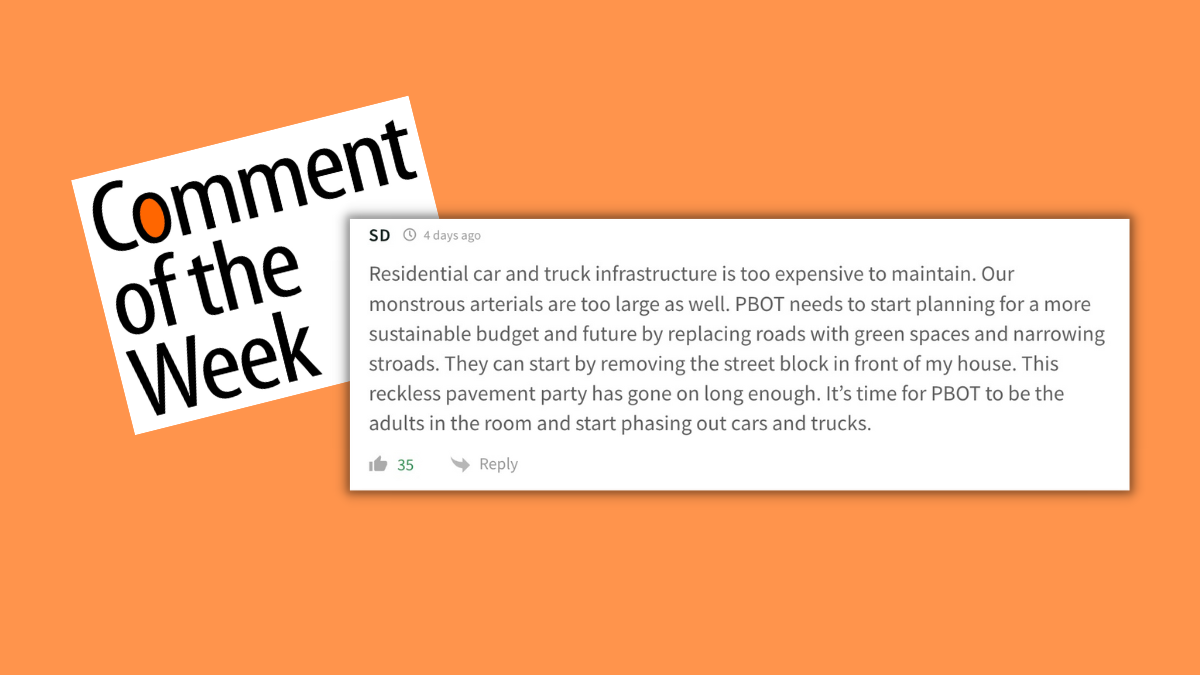
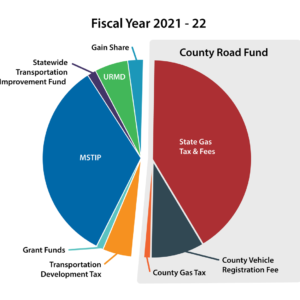
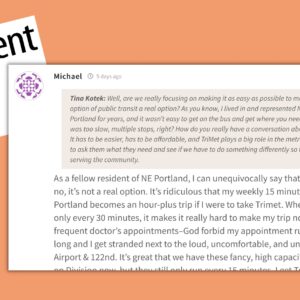
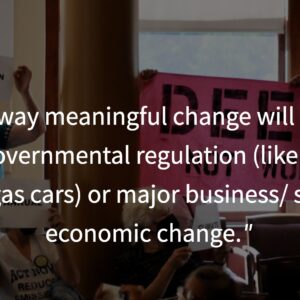
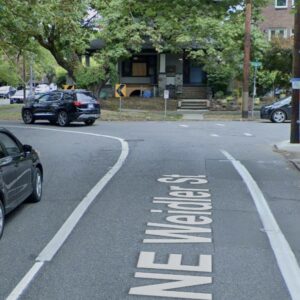
Thanks for reading.
BikePortland has served this community with independent community journalism since 2005. We rely on subscriptions from readers like you to survive. Your financial support is vital in keeping this valuable resource alive and well.
Please subscribe today to strengthen and expand our work.
I somehow missed this great comment in the original thread. But it mirrors some of my thinking on the issue. If the city can’t afford to maintain the infrastructure, one (simplistic) solution is to raise taxes. Another is to cut back on the infrastructure you can’t afford to maintain.
I’m very curious as to what PBOT actually brings to the table besides crying about resources. This cannot be a surprise to those 5 seats that make the decisions. Tbh, maybe it’s time to give up on this town. They simply can’t figure it out and they promise big to get us excited and deliver little. I continually watch resources being wasted in front of my house to solely reduce speeds for drivers and nothing for other modes “for the greater good.” Wow, I know why the bureau needs to hire an outside polling firm to figure out why 3% of our commuters are on bike….
After repeated backlash at trying to find funding for the incredibly expensive road infrastructure it really makes sense for the “find out” comeuppance to be a major reduction in the amount of car access streets and roads that we maintain. All of these drivers who are against tolling, congestion pricing, parking passes, etc. as a means to fund the car infrastructure can live with what the funding can actually afford, so we can just start blocking car access to the majority of streets to reduce wear and ongoing maintenance costs.
Cars can be stored a block or two away from their house where a car street still exists and they can have just a few designated “car safe” streets that take them to the highway where they can spend the majority of their transit time. I’m sure they will loudly complain about the designated car streets being too few, not going all the way to their destination, taking circuitous routes, etc. but cyclists have dealt with those issues for decades so it must not be a real problem, right?
Update: I thought some more about this over the weekend and now I am sure that it is totally doable : )
I am going to approach de-paving 50% of Portland roads like the socio-technological inevitability that it is and energetically deploy it as third-wave 2023 party banter. Much much better than autonomous vehicle blah, blah, blah.
Something like…
“Hey, how’s it going.. long time… pandemic- right?”
“You ever notice how Portland has tiny residential blocks? Four blocks could easily be merged into one block and the asphalt within the new larger block could be replaced by a more narrow two-way MUP trail, gardens, trees, etc. The residential grid could be broken up for car travel and connected for bike/ trike/ golf-cart travel. E-bikes really make this possible. It is a paradigm shift, but people will really get something very tangible and satisfying for a relatively modest change. More space for their wild kids and pets…. Heat islands….. storm water drainage and permeable surfaces…. less cars means more reliable faster transit on the arterials, less noise… you can easily travel 5 miles in 15-20 minutes on an e-bike in Portland. Have you ever looked at a map and seen how much is within 5 miles of your house? The costs of car-based transportation systems are a huge drain on individuals and the city/ state economy. Most of that money leaves the community… Yes, I probably could eat tacos every day if I had a good filing rotation.”
Years ago I was on a mailing list for the PBOT street-vacating process. Almost all the vacation requests were for lightly-used streets. I wrote PBOT and asked why that was, because it seemed like it’s the busy streets that really deserve vacations.
For some reason, PBOT didn’t respond. But I love how this comment of the week goes straight past the baby steps of making streets work better for people–straight past the “should we widen the sidewalks/slow traffic/take out three parking spaces…” to “Do we really need this street at all?”
It would be tough to start doing a huge number of wholesale street closures, but there really are many–especially in residential neighborhoods, such as at the narrow ends of blocks–where the streets don’t even have any driveways opening onto them, where the pavement and auto traffic could be removed with little or no impact on vehicle travel. You could start with those and work up from that.
It’s a very logical idea.
You should ask around about what happened at Avalon Sanctuary in the HAND neighborhood, where a street stub got vacated and turned over to the community to create a garden managed by volunteers from City Repair. You may have heard about it a year or so ago when someone firebombed an RV parked there over a camping-related territorial dispute. From what I’ve heard, it’s been a multi-year clusterfuck, including people breaking into the adjacent preschool to do drugs in their playground.
So maybe first we address root causes then we can start vacating streets.
There are also dozens or hundreds of examples where streets were vacated without problems.
Great point that I forgot to mention. There really is something in this for everyone. For people who love the tragedy of the commons- more commons equals more tragedy! More scary anecdotes, more coyote sightings, more lost pets, more neighborly squabbles! Grab your pearls, Next door is going to be !